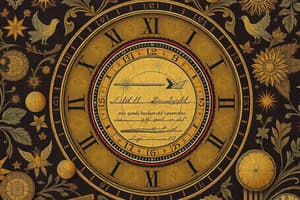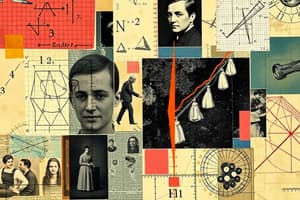Podcast
Questions and Answers
What is the main purpose of set theory in mathematics?
What is the main purpose of set theory in mathematics?
To examine collections of objects and define operations like intersection and union.
What role does logic play in problem-solving?
What role does logic play in problem-solving?
Logic provides principles of valid reasoning and helps identify fallacies in arguments.
What distinguishes discrete mathematics from continuous mathematics?
What distinguishes discrete mathematics from continuous mathematics?
Discrete mathematics focuses on objects that can be counted, such as finite structures.
How are sets utilized in data analysis?
How are sets utilized in data analysis?
What is graph theory, and why is it important?
What is graph theory, and why is it important?
What are the four basic operations in arithmetic?
What are the four basic operations in arithmetic?
What is the significance of understanding place value in arithmetic?
What is the significance of understanding place value in arithmetic?
How does algebra utilize symbols and variables?
How does algebra utilize symbols and variables?
What are the key components studied in geometry?
What are the key components studied in geometry?
What are the two major branches of calculus?
What are the two major branches of calculus?
What are measures of central tendency in statistics?
What are measures of central tendency in statistics?
What role does calculus play in scientific fields?
What role does calculus play in scientific fields?
How does statistics quantify uncertainties in data?
How does statistics quantify uncertainties in data?
Flashcards
Set Theory
Set Theory
The study of collections of objects, including their operations like intersection, union, and difference. It helps categorize and analyze information.
Logic
Logic
The study of valid reasoning, establishing rules of inference and identifying fallacies in arguments. It's crucial for making sound conclusions.
Discrete Mathematics
Discrete Mathematics
A branch of mathematics that studies countable, discrete objects and structures, like graphs, trees, and algorithms.
Graph Theory
Graph Theory
Signup and view all the flashcards
Statistical Analysis
Statistical Analysis
Signup and view all the flashcards
What is Mathematics?
What is Mathematics?
Signup and view all the flashcards
What is Arithmetic?
What is Arithmetic?
Signup and view all the flashcards
What is Algebra?
What is Algebra?
Signup and view all the flashcards
What is Geometry?
What is Geometry?
Signup and view all the flashcards
What is Calculus?
What is Calculus?
Signup and view all the flashcards
What is Statistics?
What is Statistics?
Signup and view all the flashcards
What are the Properties of Numbers?
What are the Properties of Numbers?
Signup and view all the flashcards
What is Dispersion in Statistics?
What is Dispersion in Statistics?
Signup and view all the flashcards
Study Notes
Introduction to Mathematical Concepts
- Mathematics is a fundamental field of study dealing with quantities, structures, space, and change.
- It uses logic and abstract reasoning to formulate and solve problems.
- Key branches include arithmetic, algebra, geometry, calculus, and statistics.
- Mathematics underlies many scientific disciplines and technological advancements.
Arithmetic
- Arithmetic deals with basic operations on numbers.
- These include addition, subtraction, multiplication, and division.
- Arithmetic is the foundation for more advanced mathematical concepts.
- Understanding place value is crucial.
- Properties of numbers, such as commutativity, associativity, and distributivity, simplify calculations.
Algebra
- Algebra uses symbols and variables to represent unknown quantities.
- It allows for generalizations of arithmetic principles to solve problems with unknowns.
- Key concepts include equations, inequalities, expressions, and functions.
- Solving equations and inequalities for variables is a major focus.
- Understanding different types of functions (linear, quadratic, polynomial, etc.) is important.
Geometry
- Geometry studies shapes, sizes, and positions of figures in space.
- It involves concepts of points, lines, angles, triangles, quadrilaterals, and more complex shapes.
- Euclidean geometry is a fundamental system of axioms defining geometric properties in two and three-dimensional space.
- Geometry plays a critical role in architecture and engineering.
Calculus
- Calculus deals with continuous change and its rates; the study of motion, growth, and change.
- It has two major branches: differential calculus (rates of change) and integral calculus (accumulation of quantities).
- Key concepts include limits, derivatives, integrals, and applications to problems involving motion, area, volume, and optimization.
- Calculus is fundamental to many scientific fields like physics and engineering.
Statistics
- Statistics is a mathematical science that deals with the collection, analysis, interpretation, and presentation of data.
- It uses probability and other mathematical methods to quantify uncertainties and trends within data sets.
- Key concepts include measures of central tendency (mean, median, mode), measures of dispersion (variance, standard deviation), and probability distributions.
- Statistical methods are used to draw inferences from samples about populations.
- Statistical analysis is important for data-driven decision-making.
Set Theory
- Set theory examines sets, which are collections of objects.
- It defines operations on sets (intersection, union, difference, and complements).
- Sets are used to categorize and analyze information.
- Set theory underpins many areas of mathematics, particularly logic and abstract algebra.
Logic
- Logic studies the principles of valid reasoning.
- This includes establishing rules of inference and identifying fallacies in arguments.
- Logic is relevant for problem-solving and making valid conclusions.
- It is used in all areas of mathematics and computer science.
Discrete Mathematics
- Discrete mathematics studies objects that can be counted (as opposed to continuous).
- It deals with finite objects and structures such as graphs, trees, and algorithms.
- It is important for computer science and other areas needing discrete analysis.
- Graph theory, a subset of discrete mathematics, deals with relationships between objects.
Studying That Suits You
Use AI to generate personalized quizzes and flashcards to suit your learning preferences.




